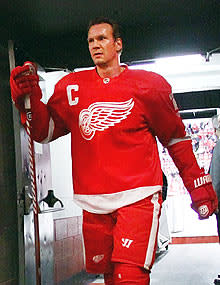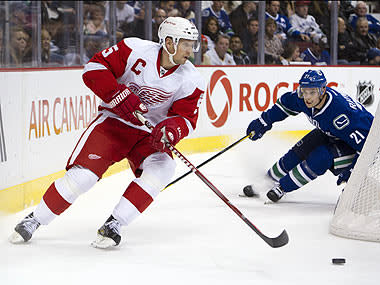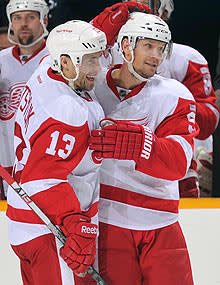Nicklas Lidstrom: Still perfect after all these years
DETROIT – The calendar is about to flip to 2012, but when it comes to Nicklas Lidstrom, the Detroit Red Wings are already thinking ahead to 2013.
Lidstrom is 41. He is playing on his second straight one-year, $6.2 million contract. He will turn 42 on April 28, and he will evaluate his future after the Wings' season ends, not before. His teammates respect that.
But they can't help themselves. They see how Lidstrom's greatness remains undiminished, making him a candidate to catch Bobby Orr in the record book and win his eighth Norris Trophy as the NHL's best defenseman. They seize every opportunity to tease their captain about coming back in 2012-13.
Take Tuesday night. With the Wings facing a 2-0 deficit, Lidstrom scored to spark a 3-2 comeback victory over the St. Louis Blues. That gave him eight goals this season, tying him for second among NHL defensemen. That gave him 1,131 points in his career, moving him into the top 50 NHL scorers of all-time.
"It's good … for next year," said teammate Henrik Zetterberg with a smile and without prompting. "You always think for next year."
Zetterberg laughed.
"You don't want it to be the last when he keeps playing like this," Zetterberg said. "He's still one of the best out there, and he'll probably go up for the Norris again. It's amazing at that age what he still can do."
So this isn't just the media manufacturing a story? The Wings really raise the subject themselves?
"Oh, yeah," Zetterberg said. "We do. We try all the time. As soon as something positive comes up, we remind him of that. We're trying. We know it's going to be his decision – and their family's decision – after the season. But I think it's a little easier if he keeps playing the way he does."
I teased Lidstrom, too. I told him he should sign a five-year extension so everyone will leave him alone. He just chuckled.
General manager Ken Holland just chuckled, too.
The theory is that Lidstrom will keep coming back as long as he believes he can play at an elite level and the Wings can win. Entering Friday night's game in Chicago, Lidstrom ranked fourth among NHL defensemen in plus-minus (plus-18) and was tied for eighth in scoring (23 points). The Wings were three points behind the Blackhawks in the NHL and Central Division standings with a game in hand. Holland has the salary-cap space and assets to be active before the Feb. 27 trade deadline or in the off-season.
Holland will let Lidstrom's teammates do the teasing, and he will wait to talk to Lidstrom seriously. He will give him his space.
"I approached him a couple years ago in January, and he just said, 'I'm going to decide at the end of the year,' " Holland said. "I'm sure he wants to see how his year goes, how our year goes, how he's feeling and how his motivation is, and then he's going to decide if he wants to do it all over again."
But Holland smiled. He couldn't help himself, either. He added one more thing.
"I'd love to do a two-year, three-year extension," Holland said. "I think that he can play two or three more years. Easy."
* * * * *
The irony of Lidstrom is that what makes him remarkable in hockey history makes him unremarkable on a day-to-day basis. Writing about his excellence is like writing about planes landing safely. It is not news. It is expected.
I could copy a column from last season – or even a column from several seasons ago – and update the details. The essence would be the same. Lidstrom is calm and classy, elegant and efficient, forever consistent. He wins battles with brains instead of brawn. He picks pucks out of the air but doesn't pick fights. He is the ultimate low-maintenance, high-performance player.
Calling him “The Perfect Human" has become a cliche.
Though he is widely recognized as the best defenseman of his generation, it sort of hums in the background. He is still taken for granted because he is almost too good to be interesting. Who can relate to perfection? Where is the triumph over adversity?
Because he virtually never slumps and never misses games due to injury, there are no downs to illustrate the ups – just a straight line drawn at the highest level across two decades. There are no occasions to note him unless he reaches another milestone or wins another Norris.
Or contemplates retirement, of course.
Even fussing about his future has become routine, because he keeps coming back and playing the same way – shift after shift, game after game, year after year. It's like crying wolf. But the end will come one day, and at least the threat of it forces Lidstrom to the foreground from time to time. You don't know what you've got until it's gone – or until you worry it might be soon.
Go ahead. Look for news. Look for cracks, indications that his game might be about to crash. By focusing on what Lidstrom still is at age 41, you gain an even greater appreciation for what he has been since he broke into the NHL at age 21.
"He's one of the greatest to ever play the game," said Wings goaltender Jimmy Howard. "I don't really think you can really nitpick when you get down to it. Well, I guess that is what you can do – nitpick his game. But you're really not going to find anything."
When athletes age, their bodies and minds are supposed to break down. They're supposed to be injured more often. They're supposed to lose a step, lose their sharp hand-eye coordination, lose their motivational edge. Lidstrom hasn't lost much of anything. He said he isn't as active up the ice as he used to be, picking his spots more, but he was never overly active in the first place.
"I try to play the same," Lidstrom said. "I try to be the same player I was 10 years ago."
Lidstrom has missed only a handful of games in his entire career – many of them to rest prior to the playoffs – and he hasn't missed one since 2008-09. He told coach Mike Babcock there was no need to cut his ice time this season, so he's averaging 23:42, actually a little more than he did last year. He's still playing against the opponents' top players in every situation, and it isn't like he's taking more penalties – hooking or holding or tripping because he can't keep up anymore. He has never taken many penalties, and he has taken only seven minors this season.
His hand-eye coordination remains precise. He might be the best ever at getting shots to the net through traffic. He fires slapshots with his head up. When Lidstrom scored Tuesday night, he picked the puck off the left-wing wall, fired from the point and found the back of the net.
"If they're adjusting their angle of blocking," Holland said, "he just adjusts where he's shooting."
His reflexes are still quick, too. There was an oh-bleep moment Tuesday night when Howard turned over the puck, giving the Blues a 2-on-1. The ‘1’ was Lidstrom, though. He didn't panic. He never panics. He positioned himself so Howard could take the shooter, slowed down the play and still forced a pass. He blocked it with his leg. Bomb diffused. He made it look so easy the play didn't even make the five-minute highlight package on NHL.com.
"You feel calm when he's the last guy back there, even if it's a 2-on-1 or a 3-on-1," Zetterberg said. "You always know he will make it tough on them, and especially on those kind of plays, knocking pucks down and giving himself an extra second when he needs one. When no one else really can do it, he can do it. I think that's one of the big reasons he’s still the way he is and how good he is, because he has that seventh sense up there."
Ian White just shook his head. White was minus-10 in his first 16 games last season. Then the Calgary Flames traded him to the Carolina Hurricanes, who traded him to the San Jose Sharks. He signed with the Wings as a free agent and was paired with Lidstrom, who puts passes on his tape and gives him the confidence to make plays, knowing he has a foolproof backup. White is tied for the league lead in plus-minus at plus-25.
White raved about Lidstrom – how smart he is, how rarely he makes mistakes, how he's always in the right position and always makes the right play.
"I knew that's how he was coming in," White said, "but I didn't know the extent of how good he actually was."
* * * * *
Perhaps most important, Lidstrom hasn't lost his motivational edge. If anyone can nitpick Lidstrom's game, it's Nick himself.
"I do little things in every game that I think, you're looking back, you think you could have done a few things differently, make different decisions with the puck," Lidstrom said. "I think that that happens all the time."
Lidstrom felt he slipped in 2009-10. He was plus-22 and finished fourth in the Norris voting. But he wasn't a Norris finalist for only the second time in a dozen years, and early in 2010-11 he said: "I know I have to have a better season than I did last year, and I think I'm capable of it." He still had something to prove.
And he proved it. He came back and won his seventh Norris last season. Had he slipped further, he might have retired. But feeling he could still have fun playing up to his high standards, he decided to come back.
That didn't mean he was satisfied. He was minus-2 last season.
"That was my first season being a minus," Lidstrom said. "Nineteen years, and that one year … It bothered me a little bit."
It didn't matter that it wasn't his fault. The Wings were uncharacteristically loose defensively as a team, finishing 23rd in goals against. Howard struggled at times. "I didn't really do the best job of keeping his plus-minus high for him,” said the Wings goalie. “I'll take the blame for it. He doesn't have to take the blame for anything."
The Perfect Human still considered it a blemish on his perfect record. He still had something to prove. He still had something to drive him.
"I think you're looking at everything to make you better, or you're looking at things you want to improve heading into a season," Lidstrom said. "That was one of the things. I wanted to improve on my plus-minus. I wanted to be better at it and have a better number. There are little things in the game that you think about, that you focus on, and so far it's been working out for me."
At plus-18, Lidstrom is on pace to finish plus-41, which would fall just short of his career high of plus-43.
"I take a lot of pride in it," Lidstrom said, "because it shows you can still play against the top lines and still be able to be a plus player."
At 41 years old, Lidstrom is still among the elite of any age. The Ottawa Senators' Erik Karlsson, who leads NHL defensemen in scoring but struggles defensively, is 21 and could be Lidstrom's son. The Nashville Predators' Shea Weber and Ryan Suter, the best defensive pair in the league, are both 26. The Boston Bruins' Zdeno Chara, a candidate to win his second Norris this season, is 34, but that's still seven years younger than Lidstrom is.
"You're talking about a guy who's going to be 42," Holland said. "Shea Weber's really good. Zdeno Chara has a real impact on the game. There's one or two others. But Nick is right there with the very best defensemen in the league today, and these guys are in their 20s and 30s and in the prime of their career."
Maybe Lidstrom has his own definition of the word "prime."
"Obviously," Holland said, "he's defied Father Time."



